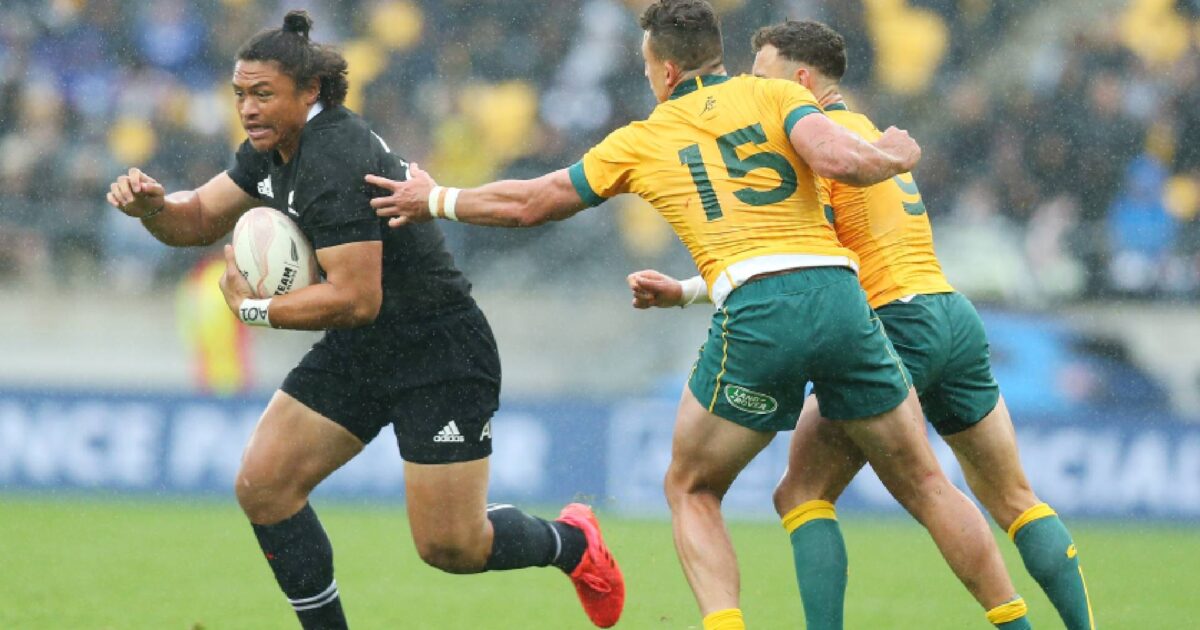'Did I just lose us the game?': All Blacks star Caleb Clarke opens up on why his 'heart sank' in 'rollercoaster' test debut

If there are positives to be taken out of the All Blacks‘ 16-all draw with the Wallabies in the opening Bledisloe Cup test of the year, the efforts of newly-capped New Zealand wing Caleb Clarke would have to be one of them.
Named on the All Blacks bench, the 21-year-old was rewarded for a barnstorming campaign with the Blues when he was injected into yesterday’s match in Wellington as a replacement for Damian McKenzie with little more than 10 minutes to play.
In doing so, he was handed his first test cap for the All Blacks, and marked the occasion with multiple flashes of the destructive power than made him such a force to be reckoned in Super Rugby Aotearoa.
As the rain pelted down at Sky Stadium in the Kiwi capital, Clarke made himself a constant menace on the left wing, utilising his 1.89m, 107kg frame to constantly punch his way through the Australian defensive line when he got his hands on the ball.
It was a cameo showing that was worthy of sparking a selection debate leading into the second Bledisloe Cup test in Auckland this week about whether he warrants a place in the starting lineup at Eden Park.
There would be plenty of advocates for Clarke’s promotion into the starting XV in place of George Bridge, who assisted Aaron Smith’s try and played a part in the lead-up to Jordie Barrett’s score, but otherwise lacked the impetus that Clarke provided.
That’s not exactly how Clarke will remember his maiden appearance for the All Blacks, though.
While the All Blacks Sevens star was impressive on attack, the youngster – who emulated his father and former 10-test All Blacks midfielder Eroni in playing for New Zealand – took a more grounded view on his performance.
In fact, there was one moment in the final stages of the game that stands out for Clarke, when Australian utility back Reece Hodge lined up a potentially game-winning penalty shot from inside his own half three minutes into injury time.
Renowned for his long range goal-kicking, Hodge was unfortunate in the extreme to have his 53m effort denied by the right-hand post, but a spillage of the wet ball by Clarke from the rebound left him anxious about how that might have impacted the result.
“When they got that penalty on halfway, I was hoping that one would miss, and it did, but I ended up dropping that ball off the posts, so at first my heart sank,” Clarke said upon reflection of a frantic injury time period that lasted nine minutes.
“The first thing I actually thought was, ‘Did I just lose us the game?’, but then we fought back, defended our line really well. I was just hoping we weren’t going to get penalised.”
WHAT?! This. Last. 8. Minutes. Of. Rugby. ? ? ?
#BledisloeCup pic.twitter.com/QcnpCftgih
— Sky Sport NZ (@skysportnz) October 11, 2020
A tenacious defensive effort by the All Blacks ensured the hosts weren’t penalised on their own tryline, with an Ardie Savea turnover sparing Clarke’s blushes from what could have been a disastrous moment in an otherwise fine test debut.
That yielded an attacking charge downfield that forced the Wallabies to hold firm on their tryline, but failure to execute with ball in hand or attempt a drop goal meant victory proved elusive for both sides.
“Then the turnover happened, and then [we] were just keen to attack, just wanted to get that first win, and I thought we were when we were right on their line, so it was quite the emotional rollercoaster, for me personally,” Clarke recalled.
Despite his late knock-on, Clarke said he was “buzzing” to have made his first appearance on the international stage.
“It’s pretty surreal when you do something, when you achieve such a big goal in your life. It’s a big process to work towards that thing, so I’m still buzzing.
“The one thing that sticks out for me, though, is dropping that kick off the posts, that last penalty.
“But I’m just so glad to tick off something so big in my life, and to get to do it alongside my mates Patty [Patrick Tuipulotu] and Hosk [Hoskins Sotutu], alongside people I grew up with, yeah, it’s special.”
Whether All Blacks head coach Ian Foster and his fellow selectors will tinker with the starting lineup for the second test this Sunday remains to be seen, but there is plenty of hunger for Clarke to add to his test tally in his hometown.
“Now I’ve got that first test, I just want a bit more now, and just see what Fozzie has to say, but all in all, just real happy and grateful to firstly get on the field and then get to play.”











































